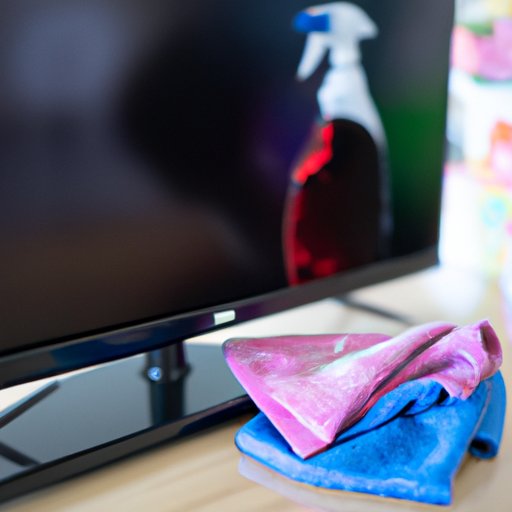
Introduction
When it comes to keeping our entertainment centers clean, we often ignore the importance of cleaning our TV screens. However, cleaning a TV screen regularly should be a part of our cleaning routine. Not only does it improve the picture quality, but it can also extend the lifespan of the television. In this article, we will provide you with a complete guide to cleaning your TV screen.
The Dos and Don’ts of Cleaning a TV Screen
Cleaning a TV screen is a delicate process, which means that you have to be careful about what you use to clean it. Here are some dos and don’ts of cleaning a TV screen:
- Do use a gentle microfiber cloth to clean your TV screen, as it won’t scratch or damage the screen.
- Don’t use harsh cleaning chemicals like ammonia or alcohol, as they can damage the screen’s protective layer.
- Do use distilled water or a specialized TV cleaning solution to clean the screen.
- Don’t spray liquids directly onto the screen, as it can seep into the TV and cause damage.
- Do turn off the TV and unplug it before cleaning. This will help you avoid electrical shock and accidental damage to the screen.
Following these dos and don’ts will help you keep your TV screen clean without damaging it.
The Best Products and Materials for Cleaning a TV Screen
When it comes to cleaning a TV screen, not all cleaning products are created equal. Here are some of the best materials you can use:
- Microfiber cloth: This is the best option for cleaning your TV screen. It’s gentle and effective, and it won’t damage the screen.
- Water: Distilled water is safe to use on the TV screen and won’t leave mineral deposits behind.
- Rubbing Alcohol: If you have stubborn stains or fingerprints on your TV screen, rubbing alcohol is an effective solution. Just make sure to dilute it with distilled water to prevent damage to the screen.
- Specialized TV cleaning solution: There are specialized TV cleaning solutions available in the market that are effective in cleaning the screen. These solutions are specifically designed to clean the screen without damaging it.
Make sure you have these materials on hand before attempting to clean your television.
Step-by-Step Guide to Cleaning a TV Screen
Here’s a step-by-step guide to cleaning your TV screen:
- Turn off your TV and unplug it from the power source.
- Use a dry microfiber cloth to remove any dust or debris on the screen.
- If you have stubborn stains, use a lightly dampened microfiber cloth or a specialized TV cleaning solution.
- Wipe the screen gently in a circular motion with the microfiber cloth.
- If necessary, repeat the process until the screen is clean.
- Use a dry microfiber cloth to remove any remaining moisture from the screen.
- Plug in your TV and turn it on to make sure there are no streaks or marks on the screen.
Following these steps will help you keep your TV screen clean and shiny.
FAQ Section
Here are some frequently asked questions about cleaning a TV screen:
- Q: Can I use paper towels or tissues to clean my TV screen?
- A: No. These materials can scratch the screen and leave fibers behind.
- Q: How often should I clean my TV screen?
- A: It’s recommended that you clean your TV screen once a month.
- Q: Can I clean my TV screen with a wet cloth?
- A: It’s not recommended as the water can seep into the TV and cause damage.
- Q: Can I use vinegar to clean my TV screen?
- A: No. Vinegar is acidic and can damage the screen’s protective layer.
Conclusion
Cleaning your TV screen is an essential part of maintaining your entertainment center. By following the dos and don’ts, using the right materials, and following a step-by-step guide, you can keep your TV screen clean and shiny. Remember to be gentle when cleaning your TV screen and avoid using harsh chemicals or materials that can damage it. With the right approach, you can enjoy a great viewing experience with a TV that looks as good as new.




